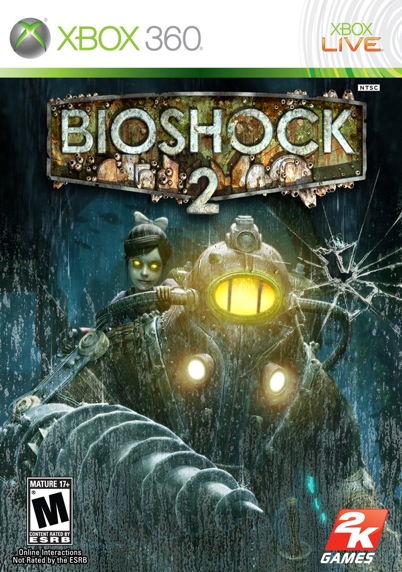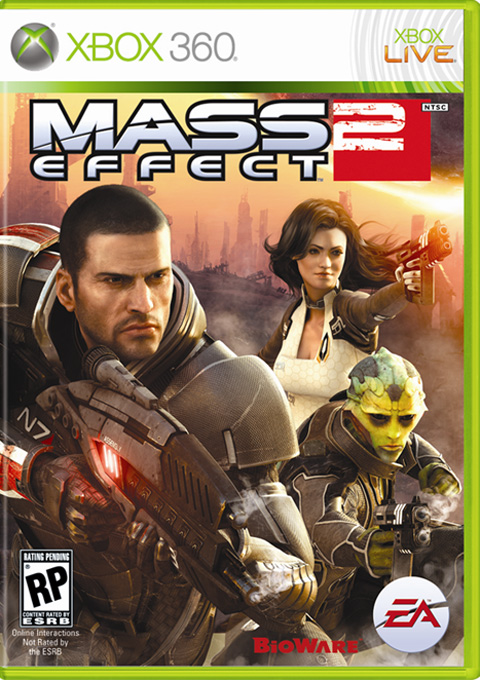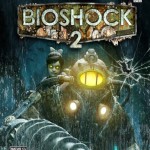I noticed that I hadn’t done a “what I’m playing” post in a while. So here are some quick observations for some of the games I’ve finished recently. These are not in lieu of proper reviews, something I’d really like to get around to writing, but just a handful of observations I made while playing the game. I’d really like to get back to some game talk.

Bioshock 2
I made the big mistake of stopping my playthrough of the first Bioshock about 30 minutes before the end (in favor of Halo 3). I went back to finish the game prior to Bioshock 2’s release. It didn’t have the emotional impact it could have had, because at that point I had sort of forgotten what I was fighting for. I didn’t let that happen with Bioshock 2.
I thought Bioshock 2 was a great sequel (prequel) in the sense that while some of the changes were drastic (being a Big Daddy being the most drastic) the majority were not. They were simply tweaks to the original. So in that regard, it was comforting to know how to do what. It was very easy to drop back into the mindset of playing the original (even if it had been three years for most). That is a sign of a good sequel.
The act (and weight) of being a Big Daddy gives you a sense of power you didn’t get in the first game while you were fighting them. The heft of the drill arm and the weight of your footfalls make this a completely different experience. That being said, I still never felt all-powerful.
This is something I’d like to expound on further, but I love that we finally got to see Rapture in its Utopian State. Both the original Bioshock and Bioshock 2 are set in the dystopian version of Rapture, after it has fallen. We are told (through the story) that it was once a beautiful, fantastical place. Bioshock 2 finally gives us a glimpse at that utopia. I wanted more.
Bioshock 2 get a Buttonmashing Mash of Approval™
Splinter Cell Conviction
I’m an old-school Splinter Cell fan. I played the first iteration on the Gamecube through completion. I really got into the character of Sam Fisher and I took his methods seriously. I liked hiding bodies. I liked hiding in the shadows. I liked shooting the Ring Airfoil Projectiles that knocked the bad guys unconscious instead of exploding their brain parts. I felt more in the game and in the character. When a bad guy had to be taken down permanently I acted with extreme prejudice. But I liked having my options.
Conviction, on the other hand, was different. Still rather enjoyable, but different. What’s the point of hiding the unconscious guard’s body when everyone in a two mile radius is going to end up dead anyway? I guess it was time for a change in mindset. That’s fine. Conviction was satisfying in other ways. Particularly the mark and execute. Sure, sometimes it amounted to nothing more than the Win Button, but I’m okay with that. I earned my chance to use it and I’m going to use it. It’s put to exceptionally good use in a stretch of the game where you need to evacuate the premise in a timely fashion. It literally became the Win Button for an extended period of time.
The game as a whole wasn’t particularly difficult and, in the end, perhaps a little shallow, but Conviction was a pretty fun game.
Mass Effect 2
I have a lot to say about Mass Effect 2. The short and sweet would be to say that it is a great game that I love. That leaves a thread that is too much to get into here, but I had a couple moments in the game that I wanted to mention.
The first isn’t a specific moment, but a culmination of little details that really made Mass Effect 2 personal. I don’t remember who I read that mentioned this, but one of the great things about Mass Effect 2 was that even though the over-arching story is the same for everyone, the little details, the little experiences were different for everyone. Sure, my choice to kill Wrex in the first Mass Effect changed the story lines and the way I was received by the Krogans in Mass Effect 2, but it didn’t kill my chances to gain the loyalty of Grunt. Little flourishes like this may simply be either-or branches in the story but they went a long way in personalizing the story for me and probably only me.
The second moment was the Geth story line. (This part has minor spoilers) During the mission to acquire the IFF (Identify Friend/Foe) device of the Reapers, you are aided by what appears to be a rogue Geth sniper, which is damaged/injured in the final battle scene. You take the deactivated Geth with you on-board the Normandy and you’re given the choice to activate it or hand it over to Cerberus. (I should mention at this point that the Geth are my favorite “race” in the Mass Effect universe and I feel a certain affinity toward them.) That inevitably led me to keep and activate the damaged Geth. At which point I had the most meaningful story line in the game. As the reactivated Geth relayed to me the nature of the Geth, the schism that occurred between the “logical” Geth and the corrupted Geth that followed and aided Saren, I felt an immediate connection to his/her/its story. When it finally told me to refer to it as “Legion,” I was immediately impacted. This intersection of technological mythology and familiar Biblical reference made him/her/it feel real to me, more real than any of the “living” characters. From that point forward, Legion accompanied me on almost every mission thereafter and has firmly taken the place of “my favorite character in the Mass Effect Universe”™
So that’s what I’ve played recently. Up next is what I’m actually playing.


